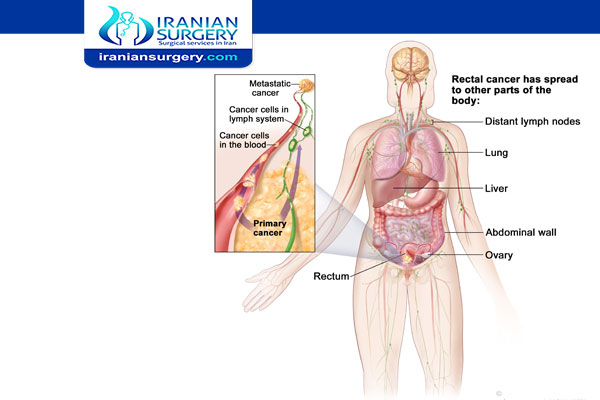What is stage 3 rectal cancer?

What is stage 3 rectal cancer?
What is the survival rate of stage 3 rectal cancer?
Can Stage 3 rectal cancer be cured?
Does rectal cancer spread fast?
How long can you live with rectal cancer?
Stage III rectal cancer is divided into stages IIIA, IIIB, and IIIC.
Stage IIIA rectal cancer. Cancer has spread through the mucosa of the rectum wall to the submucosa and may have spread to the muscle layer, and has spread to one to three nearby lymph nodes or tissues near the lymph nodes. OR, cancer has spread through the mucosa to the submucosa and four to six nearby lymph nodes.
Most people with stage III rectal cancer will be treated with chemotherapy, radiation therapy, and surgery, although the order of these treatments might differ.
Read more about : What is colorectal cancer?
Read more about : Signs a fissure is healing
Most often, chemo is given along with radiation therapy (called chemoradiation) first. This may shrink the cancer, often making it easier to take out larger tumors. It also lowers the chance that the cancer will come back in the pelvis. Giving radiation before surgery also tends to lead to fewer problems than giving it after surgery.
Chemoradiation is followed by surgery to remove the rectal tumor and nearby lymph nodes, usually by low anterior resection (LAR), proctectomy with colo-anal anastomosis, or abdominoperineal resection (APR), depending on where the cancer is in the rectum. If the cancer has reached nearby organs, a more extensive operation known as pelvic exenteration may be needed.
After surgery, chemo is given, usually for about 6 months. The most common regimens include FOLFOX (oxaliplatin, 5-FU, and leucovorin), 5-FU and leucovorin, CAPEOX (capecitabine plus oxaliplatin), or capecitabine alone. Your doctor will recommend the one best suited to your health needs.
Another option might be to get chemotherapy alone first, followed by chemo plus radiation therapy, then followed by surgery.
For people who can’t have chemo plus radiation for some reason, surgery (such as an LAR, proctectomy with colo-anal anastomosis, or APR) might be the first treatment. This might be followed by chemotherapy, sometimes along with radiation therapy.
Read more about: rectal cancer causes
Read more about: rectal cancer symptoms
What is stage 3 rectal cancer?
Stage III rectal cancers have spread to nearby lymph nodes but not to other parts of the body.
Most people with stage III rectal cancer will be treated with chemotherapy, radiation therapy, and surgery, although the order of these treatments might differ.
What is the survival rate of stage 3 rectal cancer?
For rectal cancer, the overall 5-year survival rate for people is 67%. If the cancer is diagnosed at a localized stage, the survival rate is 89%. If the cancer has spread to surrounding tissues or organs and/or the regional lymph nodes, the 5-year survival rate is 71%. If the cancer has spread to distant parts of the body, the 5-year survival rate is 15%. Stage I cancers have a survival rate of 80-95 percent. Stage II tumors have survival rates ranging from 55 to 80 percent. A stage III colon cancer has about a 40 percent chance of cure and a patient with a stage IV tumor has only a 10 percent chance of a cure.
Read more about: Rectal bleeding
Can Stage 3 rectal cancer be cured?
In general, stages 0, I, II, and III are often curable with surgery. However, many people with stage III colorectal cancer, and some with stage II, receive chemotherapy after surgery to increase the chance of eliminating the disease. People with stage II and III rectal cancer will also receive radiation therapy with chemotherapy either before or after surgery. Stage IV is not often curable, but it is treatable, and the growth of the cancer and the symptoms of the disease can be managed. Clinical trials are also a treatment option for each stage. Treatment usually involves surgical removal of the tumor followed by adjuvant chemotherapy. A clinical trial may also an option. For rectal cancer, radiation therapy may be used with chemotherapy before or after surgery, along with adjuvant chemotherapy.
Read more about: Does colorectal cancer occur in old people?
Read more about: Rectal Cancer Staging
Does rectal cancer spread fast?
Rectal cancer most often spreads to the liver. This happens in part because the blood supply from the large intestine, which includes the rectum, is connected to the liver through a large blood vessel. colorectal cancers can be graded low grade or high grade. Grade focuses on how different the cancer cells look from a normal cell. High grade cancers have a tendency to grow and spread more rapidly. In most cases, colon and rectal cancers grow slowly over many years.
Read more about: Colorectal cancer risk factors
Read more about: rectal abscess antibiotics
How long can you live with rectal cancer?
Survival rates for any cancer are often reported by stage, the extent of spread when the cancer is identified. For colon and rectum cancer, around 39% are diagnosed at the local stage, before the cancer has spread outside the local area. The five-year survival for these patients with localized colon and rectum cancer is around 90%.
When the cancer has spread to the regional lymph nodes near the site of origin, the five-year survival rate is about 71%. When the cancer has metastasized to distant sites in the body (stage IV cancer), the five-year survival rate lowers to about 14%.
Read more about: Rectal Cancer Symptoms
Read more about: How you can Prevented from Colorectal Cancer?
Read more about : Stages of fissure healing
Read more about : Hemorrhoidectomy Surgery
Read more about : Anal Fissure Surgery

